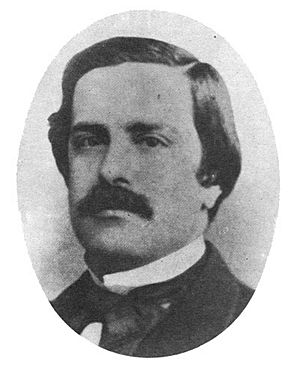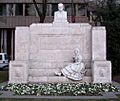Juan Valera facts for kids
Quick facts for kids
Juan Valera
|
|
|---|---|

Juan Valera
|
|
| Born | 18 October 1824 Cabra |
| Died | 18 April 1905 Madrid |
| Occupation | Politician, diplomat |
| Signature | |
Juan Valera y Alcalá-Galiano (born October 18, 1824 – died April 18, 1905) was an important Spanish writer. He was known for his realistic stories. Valera was also a diplomat, which means he represented his country in other nations. On top of that, he was a Politician, working in the government of Spain.
He was born in a town called Cabra in Spain. He lived a long life, passing away in Madrid.
Contents
A Life in Public Service
Juan Valera had a busy career serving his country. After a big event called the revolution of 1868 in Spain, he got important jobs.
Working for the Government
- He became an Assistant Secretary of State. This meant he helped manage the country's affairs.
- In 1871, he was made Director of Public Instruction. This role involved overseeing education.
Representing Spain Abroad
Valera also worked as a diplomat, living in different countries to represent Spain.
- From 1881 to 1883, he was a Minister in Lisbon, Portugal.
- He then moved to Washington in the United States, serving from 1883 to 1886.
- After that, he was in Brussels, Belgium, from 1886 to 1888.
- Later, from 1893 to 1895, he was an Ambassador to Vienna, Austria. An ambassador is a country's top representative in another nation.
Joining Important Academies
In 1900, Juan Valera was chosen to join the Academy of Moral and Political Sciences. This is a group of very smart people who study important ideas about society and government.
His Writing Legacy
Even with all his work as a diplomat and politician, Juan Valera was a very talented writer. He wrote many books and stories. His works are considered some of the best in Spanish literature. He is especially known for his "realist" style. This means his stories tried to show life as it truly was, without making things seem overly romantic or dramatic.
Images for kids
-
Monument to Valera in Madrid (L. Coullaut, 1928).
 | John T. Biggers |
 | Thomas Blackshear |
 | Mark Bradford |
 | Beverly Buchanan |


